#desiring god
Video
youtube
Why Did Demons Ask Jesus for Pigs?
2 notes
·
View notes
Text
When Mary Magdalene came to the tomb and did not find the Lord’s body, she thought it had been taken away and so informed the disciples. After they came and saw the tomb, they too believed what Mary had told them, [but] the disciples went back home, [while] Mary wept and remained standing outside the tomb. We should reflect on Mary’s attitude and the great love she felt for Christ; for though the disciples had left the tomb, she remained. She was still seeking the One she had not found, and while she sought she wept; burning with the fire of love, she longed for Him who she thought had been taken away. And so it happened that the woman who stayed behind to seek Christ was the only one to see Him. For perseverance is essential to any good deed, as the voice of truth tells us: Whoever perseveres to the end will be saved. At first she sought but did not find, but when she persevered it happened that she found what she was looking for. When our desires are not satisfied, they grow stronger, and becoming stronger they take hold of their object. Holy desires likewise grow with anticipation, and if they do not grow they are not really desires. Anyone who succeeds in attaining the truth has burned with such a great love.
Pope Saint Gregory the Great
#Pope Saint Gregory the great#saint mary magdalene#Love#the resurrection#reflect on this#perseverance#desiring god
7 notes
·
View notes
Text
She was untouched, a white dove to the sinful acts of lust, the embodiment of an Angel sent from the heavens, and I want…, no I need her. I need to feel her silky skin on my hands, carnally embracing her warmth, I crave for her lips upon mine, her sweet voice calling my name as I worship her every being. She will be mine to posses as I wish, and I will do so without hesitance, taking pleasure in her ruination.
-k❤️ (2023)
#love#writers on tumblr#love poem#love quotes#my writing#quotes#poem#writing#lust#lustful desires#desiring god#desire#angel#desirable#lustful quotes#worship#pretty words#spilled words#spilled thoughts#desire quotes#sinful desires#aemond targaryen#aemond one eye#hotd aemond#prince aemond#aemond smut#aemond#hades poem#greek gods#hades quotes
4 notes
·
View notes
Photo

© Paolo Dala
I Can Only Imagine...
We often think of creation - forests and oceans, tornados and earthquakes, lions, tigers, and bears - as wild and untamed compared with normal life. And we’re not wrong. When God placed Adam into the world he had made, even before that world fell into disorder through sin, he charged the man “to work it and keep it” (Genesis 2:15). Part of how humanity images God, then, is by bringing purpose and order to a feral world.
Look closer, however, or perhaps deeper, and we see that creation is not as wild as we typically imagine. Through the fall, Paul tells us, “the creation was subjected to futility” and suffers in “bondage to corruption” (Romans 8:20–21). It’s unfenced and yet now enslaved. It’s untamed and yet trapped. The wonders God has made are held back and smothered by sin. Even the deepest, most dangerous oceans are anchored and weighed down by the curse. Even the strongest, healthiest lions are weak and sick with judgment. Even the most brilliant sunsets are shadows of what they might be.
Of what they will be. One day soon, God will make all we know unmistakably new. Have you learned to long, and pray, for the wonders of a better world to come...
Imagine, for a moment, whatever you love about this world finally being set free and freshly charged with the glory of God.
What might the shores along O‘ahu look like glorified? What about the endless fields of tulips in the Netherlands? How beautifully might a choir of nightingales sing? Will we get to listen to rain fall and thunder roll without ever wondering what damage might be done? What might a Southern Californian orange taste like, right off the tree? How much sweeter will fresh strawberries be? Can you begin to smell the rose gardens, brighter than ever and stripped of their thorns? Can you see yourself canoeing glorified rivers, climbing glorified trails, biking through glorified fields, sitting beside glorified lakes? How soon will it all stop feeling like some wild, impossible dream?
Outside of Scripture, no one has whet my appetite for the new creation more than Randy Alcorn has. He says, “To get a picture of Heaven - which will one day be centered on the New Earth - you don’t need to look up at the clouds; you simply need to look around you and imagine what all this would be like without sin and death and suffering and corruption” (Heaven, 17). Do you ever do that? Few things are more lethal to worldliness than to imagine what this world might really be like when it sheds the curse, when God washes the oil spill from his painting and breathes it into new life.
And the light animating it all will be the nail-scarred, once-dead man on the throne. At the center will be the Lion of Judah, roaring over every mile and creature, the Lamb of God, slain to make it all possible and beautiful. John Piper writes,
“We will never forget that every sight, every sound, every fragrance, every touch, and every taste in the new world was purchased by Christ for his undeserving people. This world - with all its joy - cost him his life. Every pleasure of every kind will intensify our thankfulness and love for Jesus.” (Providence, 687)
Marshall Segal
When God Sets Sunsets Free: Imagining the World to Come
#Marshall Segal#When God Sets Sunsets Free#Imagining the World to Come#Sunset#Theology#Desiring God#Sunset Sessions#Water#Ocean#Sea#Boat#Sail#Philippines#Malay#Aklan#Borcay Island#Boracay
5 notes
·
View notes
Text
Sir Richard Baker, who was unjustly imprisoned in England in the seventeenth century, wrote,
"But how is this true, when God oftentimes withholds riches and honors and health of body from men, though they walk never so uprightly? We may therefore know that honors and riches and bodily strength are none of God’s good things; they are of the number of things indifferent which God bestows promiscuously upon the just and unjust, as the rain to fall and the sun to shine.
The good things of God are chiefly peace of conscience and joy in the Holy Ghost in this life; fruition of God’s presence, and vision of his blessed face in the next, and these good things God never bestows upon the wicked, never withholds from the godly."
The truly good things of God are bestowed on those he loves. His presence. His peace. Joy in the Spirit. The assurance of heaven and beholding his face. Nothing can take away these good things of God. They are independent of circumstances and often grow stronger in trials. Adversity may be one of God’s best gifts because it makes us grab hold of God, desperate for his presence and peace. We cling to him more tightly when there is nothing else to cling to.
27 notes
·
View notes
Text
3 notes
·
View notes
Text
The current pastor at the once-tight-with-BJU-in-its-church-constitution Heritage Bible Church in Greer, Trent Hunter, wrote this article for John Piper's Desiring God.
It's . . . a problem.
A big problem. He misdefines intersectionality (like critical race theory) as a big pagan boogie man.
It's not.
He claims that as a hetero cis white man he can explain to his adopted BIPOC children that a multiplicities of identities shouldn't be a problem.
It is false compassion when others tell my kids — over and over — that their neighbors are secretly afraid of them, that police officers are at war with them, and that their teachers don’t believe in them. Cruel is a better term for it.
It’s cruel to tell children that their future will be determined by the moral improvement of intractably racist people.
It’s cruel to tell my children that they can make it in life as long as others hold them to lower standards.
It’s cruel to tell my children that potential employers won’t hire them because of their skin color. It is equally cruel — and equally racist, it seems to me — for businesses to treat my children as particularly valuable hires because of the color of their skin.
Dude.
You're talking about The Talk. The Talk even has its own wiki page.
I am a white lady. I admit that I don't get it. But I know that The Talk is an essential part of survival for BIPOC kids.
The Brer Rabbit stories are essentially The Talk coded for Black kids trapped in slavery.
Is it cruel to tell BIPOC kids that the American system is bent toward their oppression or is it cruel that the American system is bent toward their oppression?
I think you have it mixed up. I think you need to sit down and listen for awhile.
#Bob Jones University#Intersectionality#Trent Hunter#Heritage Bible Church#Klandamentalism#Adoption#Desiring God
2 notes
·
View notes
Text
I gave my back to those who strike,
and my cheeks to those who pull out the beard;
I hid not my face
from disgrace and spitting.
—Isaiah 50:6 (ESV)
"Humans recoil from suffering. We recoil a hundred times more from suffering that is caused by unjust, ugly, sniveling, low-down, arrogant people. At every moment of pain and indignity, Jesus chose not to do what would have been immediately just. He gave his back to the smiter. He gave his cheek to slapping. He gave his beard to plucking. He offered his face to spitting. And he was doing it for the very ones causing the pain."
—John Piper, "The Intensity of Christ’s Love and the Intentionality of His Death"
0 notes
Text
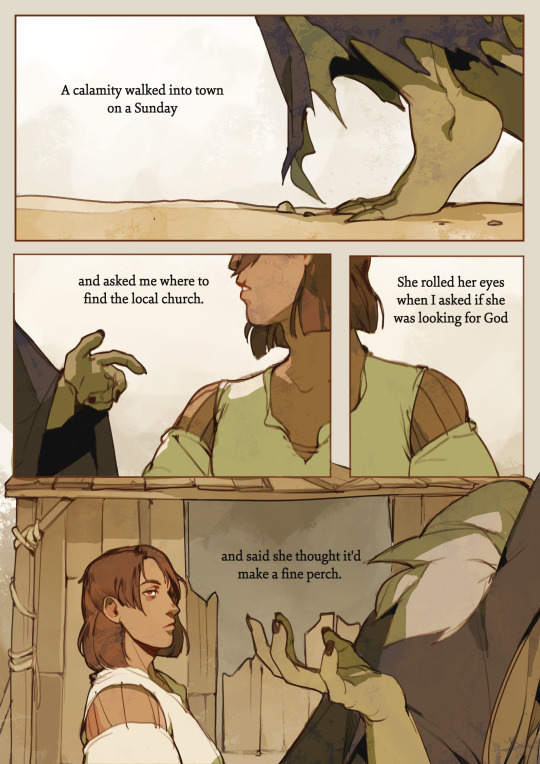
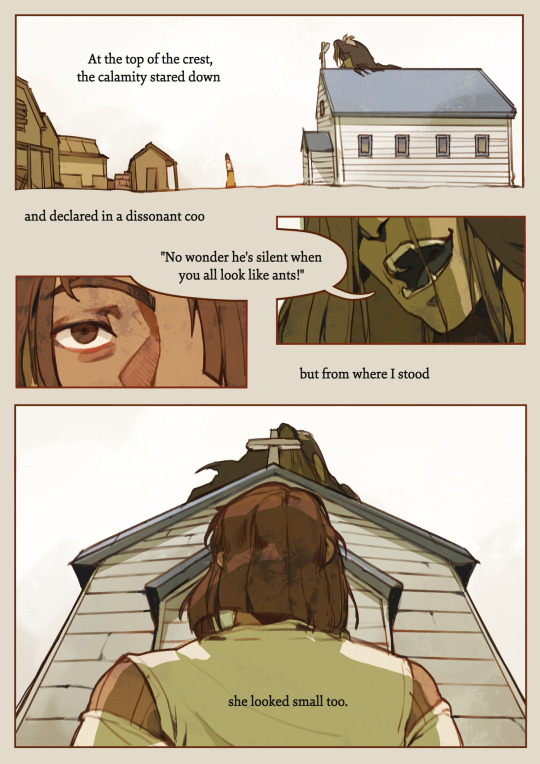
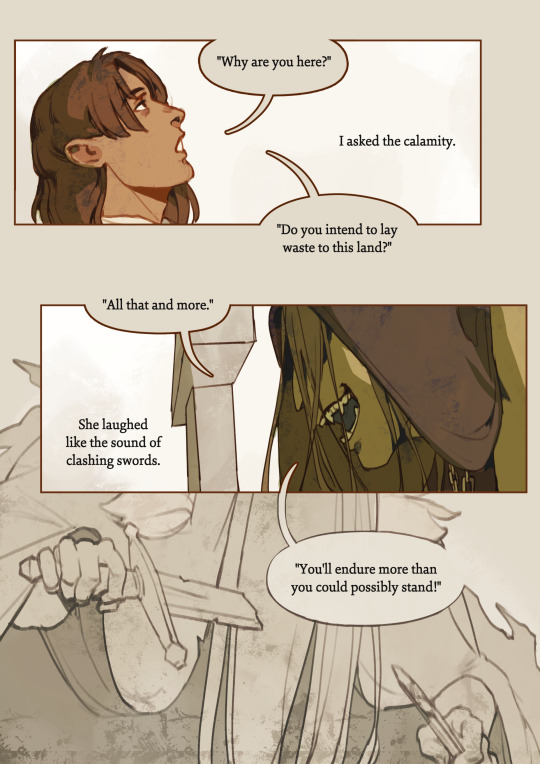
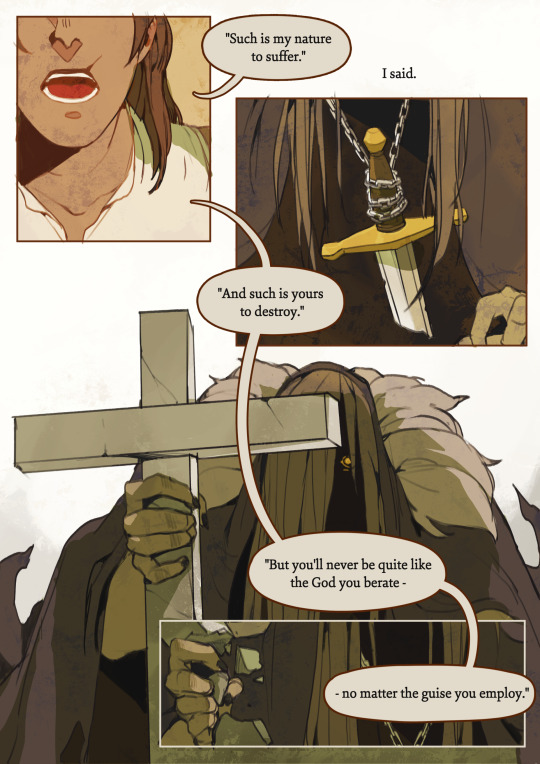

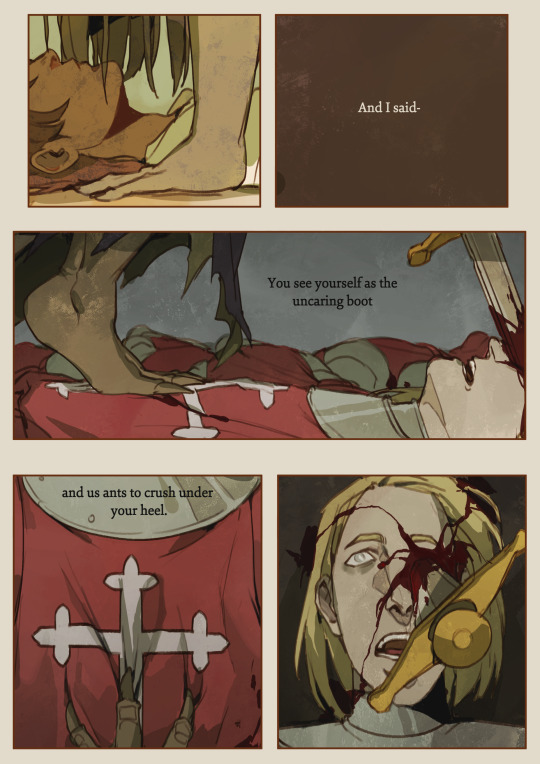
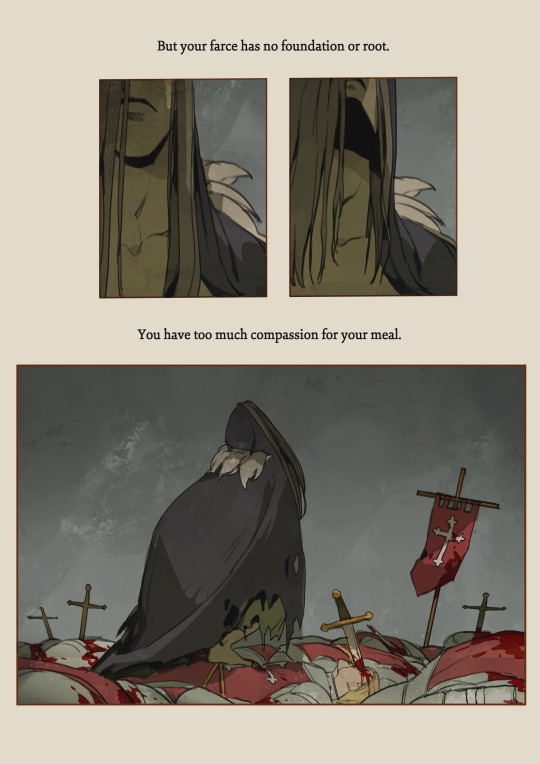
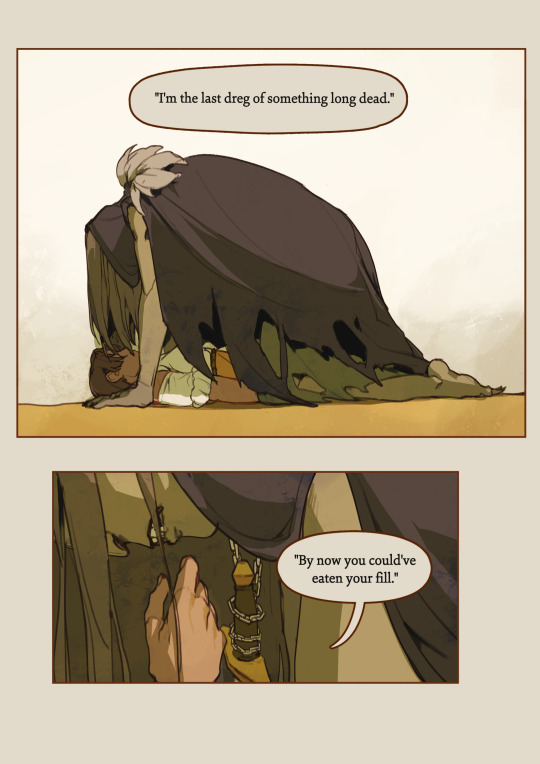
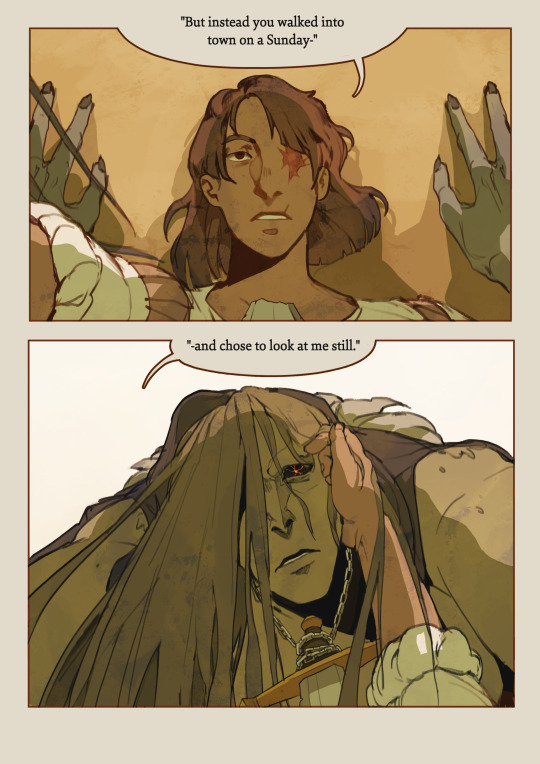
the calamity.
a comic about being seen.
--
creative notes:
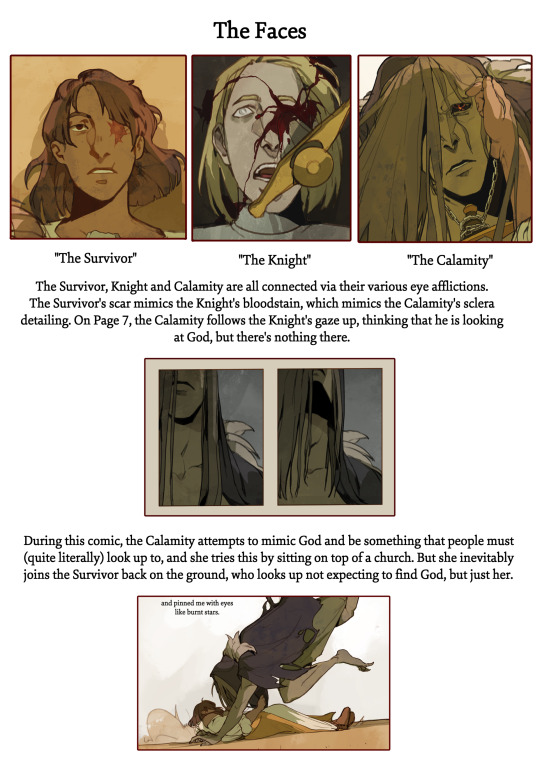

--
all my other comics
store
#cw: blood + eye scarring#oh the inherent intimacy of seeing and being seen#just a comic about how the desire to be seen and shown love and compassion unites us all#also big scary monster lady pretty#girl power! the personification of disaster and strife uses she/her pronouns!#i also feel somewhat obligated to mention here that i dont have anything against christianity as a whole#i just think the concept of God is interesting#i went to a christian school for 12 years im allowed to make this comic#comic art#sapphic#yes. interpret the subtext#stillindigo art#heartearters#thats the name of the anthology this will belong to. whenever i finish it#stillindigo comics
25K notes
·
View notes
Text
What Does Dying Daily to Self Mean to You?
“As Jesus and his disciples were on their way, he came to a village where a woman named Martha opened her home to him. She had a sister called Mary, who sat at the Lord’s feet listening to what he said. But Martha was distracted by all the preparations that had to be made. She came to him and asked, “Lord, don’t you care that my sister has left me to do the work by myself? Tell her to help…

View On WordPress
#abuse#Christianity#desiring God#Dying To Self#love#marriage#Mary and Martha#obedience#spirit-led#spousal abuse#surrender#the ten virgins#worship
0 notes
Text
youtube
0 notes
Text
To appear before the Lord is the desire of the upright, as it is the dread of the hypocrite.
Matthew Henry
18 notes
·
View notes
Text
it is so easy to shift your state - let's practice!
ok beloveds.
it is tiiiiiiiime for a little exercise.
i want you to imagine real quick what it would be like to truly be a master at manifestation. yes i know we know we are all masters because we are always manifesting but! i mean a master at conscious manifestation. like, you ALWAYS get exactly what you want in the quickest and easiest way possible no matter what. you just imagine something, decide what you're going to experience next, and boom, it shows up. faster than fast. ayeeee, you did that.
ok, so now that you ARE that person, what's your experience like? what's your way of being within yourself, within the world? you're probably super fucking relaxed, even playful. you probably never worry about anything at all because what would there be to worry about when you know you always get what you want? you probably hardly expend any mental energy on your "desires" because the second you desire something you just--beep boop--claim it as yours and, well, now that's taken care of! you're probably the most present and loving person anyone has ever known. you probably have everyone around you not-so-jokingly asking you to manifest for them (iykyk). you probably feel like god. but not god who's desperately trying to assert some kind of control over a supposed-"outer" world. no. god who knows I AM the world. I AM all. how fun.
how fun indeed, that you just shifted your (drum roll please) state of being!
did that feel good? did you like being that person?
all that took place in your imagination.
you went from being an imaginal self who was maybe stressing about manifestation, watching too many tiktok vids and reading too many twitter threads, affirming affirming affirming but at what cost, to being an imaginal self who--in an instant--already had it all. and therefore could just kick it and watch a show or eat some tacos or go candlepin bowling (my new obsession) without stressing at all.
if that felt good, why not practice being that person? by which i mean consciously choosing to embody that identity until it's so natural that it no longer needs to be a conscious decision because you simply ARE it.
don't attach anything to this. just try the state on as if it's a new hoodie and see how it feels, and if you like it--you prob will, it's pretty snuggly in here!--well, keep wearing it.
#loassumption#law of assumption#loa#loablr#loa blog#loa tips#manifestation#neville goddard#edward art#self concept#mindset#imagination#states of consciousness#desire#fulfillment#live in the end#wish fulfilled#it is done#god#goddess#god consciousness#gods promise#spirituality#spiritual journey#quantum jumping#quantum leap#self belief#inner man#inner power#inner knowing
4K notes
·
View notes
Text

© Paolo Dala
The Theology Of Sleeping
Somewhere near the beginning of my Christian life, I started associating sleeplessness with godliness. And for understandable reasons.
The sluggard of Proverbs has long lived as a vivid character in my imagination - that buffoon who flops on his bed “as a door turns on its hinges” (Proverbs 26:14), who answers his mother’s fourth knock with a mumble: “A little sleep, a little slumber . . .” (Proverbs 6:10). Then, positively, I read of psalmists who prayed at midnight and woke before dawn (Psalm 119:62, 147) — and of a Savior who rose “very early” (Mark 1:35) and sometimes passed the night without a wink (Luke 6:12).
Stories from church history also cast a shadow over my bed. I read with wonder how Hudson Taylor sometimes rose at 2:00am to read and pray until 4:00am (Hudson Taylor’s Spiritual Secret, 243). George Whitefield, too, was known to begin his day well before dawn, sometimes finishing both his devotions and his first sermon by 6:00am (George Whitefield: God’s Anointed Servant, 196). And didn’t the Puritans get just a few hours of sleep a night? The post-Puritan William Law seemed to capture the spirit of the godliest saints when he spoke of “renouncing sleep” to redeem the time (When I Don’t Desire God, 160).
Under such influences, I tried many times to carve off minutes and sometimes hours from my nightly routine, attempting to find the smallest amount of sleep I could get without losing essential functions. I greeted many midnights and dark mornings. I experimented with elaborate alarm clocks. I traded my pillow for cups of coffee.
And all the while, I did not always take seriously all that God says about sleep. I did not realize that “sometimes,” as D.A. Carson puts it, “the godliest thing you can do in the universe is get a good night’s sleep”
For all the biblical passages that hallow sleeplessness, perhaps just as many sanctify sleep. In Proverbs, the same father who warns his son about the dangers of “a little sleep” also assures him that wisdom gives good rest (Proverbs 3:24). Alongside the psalmists who praise God at midnight are others who praise him in the morning after a sound night of slumber (Psalm 3:5).
And in the Gospels, one of the more remarkable images of our Savior is of him in a storm-tossed, wave-battered boat, “asleep on the cushion” (Mark 4:37–38). He could stay up all night when needed, but he was not above taking a nap the next day.
Perhaps the most striking endorsement of sleep, however, comes from the simple fact that God made us this way. Scripture gives no indication that our need for nightly rest began in Genesis 3. And in fact, before the fruit was taken from the tree, before the weariness of sin weighed down the world, Adam slept (Genesis 2:21). Sleep, it seems, is no fallen necessity, nor merely a fleshly temptation, but a divine gift. Both then and now, God “gives to his beloved sleep” (Psalm 127:2).
And therefore, though occasions come when we must renounce sleep for the sake of something greater, Scripture gives us a more positive default posture: in Christ, God teaches us to redeem sleep. He brings our beds back to Eden, where we learn to receive sleep as healer, teacher, giver, and servant...
Perhaps a friend in need asks for a late-night phone call, or a small-group member needs an early-morning ride to the airport. Perhaps a child cries from down the hall, or a spouse just needs to talk. Perhaps hospitality ran late, or some crucial decision requires a midnight consultation with our Lord. Either way, in the face of such needs, we kindly thank sleep for its services and then dismiss it as the servant God made it to be.
When we leave our beds to walk in love, we do not leave our God. His help is stronger than sleep’s healing, his wisdom deeper than sleep’s teaching, his generosity greater than sleep’s giving. He can sustain us in our sleeplessness and, in his good time, give again to his beloved sleep.
Scott Hubbard
The Godliness of a Good Night's Sleep
#Scott Hubbard#The Godliness of a Good Night's Sleep#People#Commute#Boat#Water#Ocean#Sea#Theology#Desiring God#Sleep#Enchanted River#Hinatuan#Surigao del Sur#Philippines
1 note
·
View note
Text
The Offense of Fearing Men
Saul said to Samuel, “I have sinned, for I have transgressed the commandment of the Lord and your words, because I feared the people and obeyed their voice.” (1 Samuel 15:24)
Why did Saul obey the people instead of God? Because he feared the people instead of God. He feared the human consequences of obedience more than he feared the divine consequences of disobedience. He feared the displeasure of the people more than the displeasure of God. And that is a great insult to God.
In fact, Isaiah says it is a kind of pride to be afraid of what man can do while we disregard the promises of God. He quotes God with this piercing question: “I, I am he who comforts you; who are you that you are afraid of man who dies, of the son of man who is made like grass, and have forgotten the Lord, your Maker?” (Isaiah 51:12–13).
Fear of man may not feel like pride, but that’s what God says it is, “Who do you think you are to fear man and forget me your Maker!”
The point is this: If you fear man, you have begun to deny the holiness, the worth of God and his Son, Jesus. God is infinitely stronger than man. He is infinitely wiser and infinitely more full of reward and joy.
To turn from him out of fear of what man can do is to discount all that God promises to be for those who fear him. It is a great insult. And in such an insult God can take no pleasure.
On the other hand, when we hear God’s promises and trust him with courage, fearing the reproach brought upon God by our unbelief, then he is greatly honored. And in that he has much pleasure.
19 notes
·
View notes
Text
“That means the first step to suffering well is to die to all our confidence in self and learn to rely instead on God. If suffering turns you inward (as it tends to do), you’re likely to fall into downward spirals of despair, like so many do. If, however, suffering lifts your eyes to someone above and beyond this pain or problem, then it can become a staircase into greater courage and joy.”
#desiring god#jesus#the gospel truth#trustgod#scripture#in the presence of my saviour#grace#mind conditioning#trials
0 notes